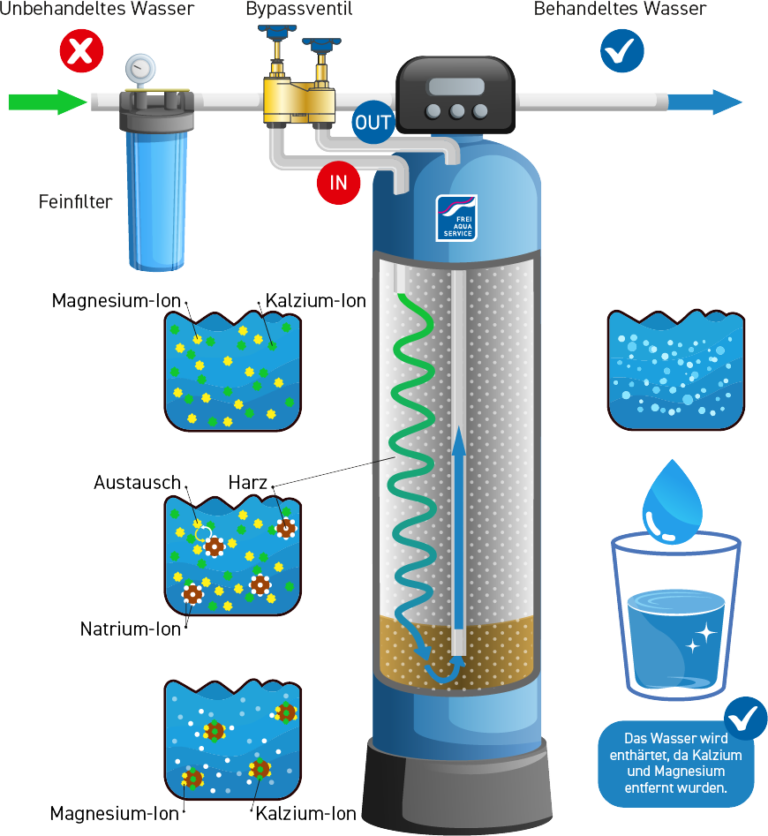- Home
- Products & Solutions
- Service & Support
- The company
- Contact us
- 24/7 emergency service
- Request
- EN
- Home
- Products & Solutions
- Service & Support
- The company
- Contact us
- 24/7 emergency service
- Request
- EN
Hard, calcareous water leaves its mark - on fittings, taps and shower heads. Limescale also builds up in the pipes. This is not only annoying, but can quickly become expensive. We show how owners of a detached house or apartment building can effectively combat the problem of hard water.
Do you live in a region with high water hardness? Then you need to be careful. This is because water hardness indicates how much lime (calcium carbonate) is dissolved in drinking water. In Switzerland, this is often measured using the so-called French degree of hardness (°fH), whereby 10 mg of calcium carbonate per liter of water corresponds to 1 °fH. The rule of thumb is: the more calcium carbonate in the water, the harder it is. Extremely hard water, i.e. over 42 °fH, is mainly found in the Jura arc - from Lägeren to Geneva - and in parts of the Lower Valais, where there is a lot of limestone. However, hard water can also be found in other parts of Switzerland, as limestone is one of the most common sedimentary rocks in the world. And this is exactly where a water softening system comes into play.
Not sure whether a descaling or water softening system is the right choice for your detached or semi-detached house? A descaling system is the same as a softening system. The term "descaling" is more colloquial, but both refer to a process in which limescale and other hardness formers are removed from the water. The system exchanges calcium and magnesium ions for sodium ions. The result: the water is "softened" and therefore softer. And this is not only visible, but also measurable. A descaling or softening system reduces the degree of hardness (measured in French (°fH) or German hardness (°dH)).
In short, installing a professional water softening system removes the very substances that are responsible for annoying limescale deposits. As a result, your household appliances, pipes and water-bearing systems remain free of damage and function reliably.
Enjoy soft water that not only protects your appliances, but also pampers your skin and laundry. Less limescale means more comfort, lower costs and a home that stays clean.
Frei AquaService AG
Answer a few short questions - we will show you a suitable Fawa® solution as a non-binding recommendation based on your information.

The softening systems from Frei AquaService AG work on the principle of ion exchange. This is a tried and tested application in which the water is passed through a tank containing a resin. The so-called cation resin has a high softening capacity. This means that it removes the calcium and magnesium ions - the main causes of water hardness - from the water and replaces them with sodium ions. As soon as the resin is saturated, regeneration takes place automatically, in which the minerals removed are flushed into the waste water. The result: water with an optimum hardness of 8-12 °fH, which not only tastes better and is kind to your skin, but is also easy on your wallet by reducing the amount of cleaning required.

Limescale is not only aesthetically unpleasant, it also attacks electrical appliances. With a water softener, you can protect your household appliances from harmful limescale deposits. Whether washing machine, dishwasher, boiler, steamer or coffee machine: save yourself expensive repairs and extend the service life of your appliances.
Did you know that limescale deposits on heating elements lead to higher energy consumption? One Decalcification system ensures that your boiler and tea kettle do not waste energy. This saves money and reduces energy costs.
Limescale stains are unsightly and cause cleaning work. With soft water, you can easily remove limescale deposits from taps, taps, shower heads and surfaces. The need for aggressive cleaning agents is greatly reduced. This saves time and money.
Showering and bathing with soft water reduces skin dryness and therefore causes less skin irritation. Research also shows that soft water has a positive effect on the hair, as it contains fewer minerals and limescale and makes the hair smoother and less brittle. A plus for your well-being and your health.
Do you enjoy a good cup of coffee in the morning? Or do you like to enjoy high-quality teas? Then you should soften your water, because coffee and tea taste demonstrably fuller and more aromatic with soft water, as the annoying limescale is no longer a flavor carrier.
They are regarded as low-cost, low-maintenance alternatives to the ion exchange process: Magnetic water softeners. But do these solutions really work? The answer: No, they are just window dressing at the expense of gullible customers. There are numerous bogus solutions on the market that promise limescale-free water without any salt, chemicals or maintenance.
At Frei AquaService, we don't rely on marketing promises or vague testimonials - but on scientifically proven facts. That is why we have critically examined all common methods - and also tested them in practice. The result was clear: only one technology was convincing - the tried and tested Ion exchange process.
In our article, we show which methods really work, why many physical methods are more wishful thinking than science - and what you should look out for if you want to protect your home or business from limescale. Find out more now: Water softening - which method is effective?
You remove the calcium and magnesium hardness components from the water, but leave all the other minerals in. This application is ideally suited for private users in single and multi-family homes or anywhere where the water is drunk and used for personal hygiene. We offer the Fawa Soft cabinet softener for single-family homes, the Fawa Top single-column softener for multi-family homes and the Fawa Pendulum and Parallel multi-column systems for special applications.
These remove all minerals from the water, which is then referred to as demineralized or demineralized water. This is primarily required for industrial purposes, mainly for residue-free cleaning of objects and surfaces.
The water softening system is usually installed directly on the main water pipe. Our service technician ensures that the system is installed correctly to ensure optimum water softening. Installation is simple and usually only takes a few hours.
A maintenance agreement is the most effective way to ensure the service life, hygiene and operational safety of a system. Ask us for a quote. After clarification, Frei AquaService AG also offers maintenance agreements for third-party systems.
"At first I was skeptical as to whether a water softener would really make a difference. Now I wonder why we didn't buy one sooner. Absolutely convincing!"

Csilla G. from Reinach BL
"The advice was excellent, the installation was done quickly and the water softener works perfectly. Great service and a product that delivers what it promises."

Andreas St. from Höri ZH
"Limescale stains? Almost no more! Thanks to the water softener, we have to clean much less and save valuable time. We wouldn't have thought that the difference would be so noticeable. We would choose Frei AquaService AG again!"

Family S. from Aesch BL
"Since we started using the water softener, we have significantly fewer limescale stains in the bathroom and kitchen. Cleaning is much quicker and everything looks cleaner for longer."

Daniel F. from Leuzigen BE
"Since we've had the water softener, the water quality is much better and limescale is a thing of the past. The water feels softer and our skin and hair also benefit. We also save on detergents and cleaners!"

Andy H. from Münchenstein BL
Whether soft or hard water - it is completely harmless to health. Calcium and magnesium are healthy and are needed by our bodies. However, the required quantities are usually absorbed through food, as these contain much larger amounts. Even with unsoftened water, you would have to drink a lot of water to cover your needs.
Yes, the taste can change slightly, water with a high lime content tastes more intense, while soft water is perceived as more neutral. However, this difference is due to local changes. Water in Ticino, for example, corresponds approximately to the values that are output by a water softening system.
No, the pH value and the proportion of free carbonic acid CO₂ in the water are not changed by softening.
Taken as food, this makes no difference, but bathing and showering does not dry out the skin nearly as much and the hair does not become brittle.
A water softening system that has been professionally installed and adjusted and is also regularly maintained is absolutely harmless. Germs can develop if a system stands idle for months and is disconnected from the water and electricity supply. Therefore, always leave the system in operation during longer absences. In such cases, the control system ensures cyclical regeneration, which prevents the development of germs.
Water hardness can be specified using various units. The unit °fH (degrees French hardness) is most commonly used, but the term °dH (degrees German hardness) is also commonly used. 1°fH corresponds to 0.56°dH. In the technical field, the unit mmol/l (millimoles per liter) is also used. 1 mmol/l corresponds to 10°fH.
Water hardness is the amount of calcium and magnesium in the water.
We recommend softening water that is over 20°fH.
There are many overviews on the Internet, organized by zip code. This information can be used as a guide, but some of it is not correct. Information on water hardness can be obtained from the local authority's drinking water supply. If you want to know exactly, you can measure the water hardness yourself with our test kit (costs CHF 30.-). It's very simple: pour 10 ml of water into the measuring device included in the kit and then add the measuring liquid drop by drop until the color changes from red to green. 1 drop corresponds to 1°fH. Our free test strip also provides an initial, approximate indication of the water hardness.
All water-bearing systems are protected, require less maintenance and last longer. Limescale deposits increase the energy consumption of appliances such as kettles, washing machines and boilers. Just 1 mm of limescale build-up on heating elements increases energy consumption by 10 %. In addition, less detergent is required.
Soft water leaves less limescale residue in pipes, boilers, toilet facilities and fittings. It extends their service life and also significantly reduces the amount of servicing required. Deposits on smooth surfaces such as glass walls or kitchen worktops do not form and can be cleaned more easily and without the use of aggressive agents. Much less cleaning agent is required, e.g. for laundry cleaning, but also when showering or bathing with soap or shampoo. The taste of tea and coffee is significantly less affected by the lower limescale content. The descaling intervals for appliances such as steamers, tea makers or coffee machines are considerably longer, which means that less descaling agent is required.
The main reason for this is that the deeper you soften the water, the more aggressive it is towards galvanized pipes and copper pipes as well as boilers and can damage them in the long term. The pH value of the water is not changed, so this is not noticeable to humans and is completely harmless. At 10-12°fH, you are in a very good and neutral range in this respect.
Values between 8 and 12° fH are considered optimal and are recommended.
The water runs through a bottle filled with a resin. This resin has the property of absorbing calcium and magnesium ions and releasing sodium ions in equivalent quantities, hence the name ion exchange. The exchange capacity of the resin is limited; when this limit is reached, the resin is treated with saline solution. This process is referred to as "regeneration". The resin then returns to its original state and can absorb calcium and magnesium again. This regeneration process runs automatically and is controlled by the mounted valve. It is important to know that the system is disconnected from the drinking water network during this process. The brine and the rinsing water are fed directly into the drain. Access to the drinking water network is only reopened by the valve once regeneration is complete. This regeneration is therefore usually carried out at night.
The system requires very little energy and costs less than CHF 20 per year.
Yes, we recommend annual maintenance. This involves cleaning the system and all its components and disinfecting the resin. In addition, all components are checked for leaks. The settings and correct functioning are checked and the water hardness settings are also checked. This way you can be sure that your system is working efficiently and trouble-free. During this visit, we will also replace the drinking water filter on request, which should also be replaced once a year for hygiene reasons.
In order to optimally define the size of the system, we should know how much water is consumed on average per year. This information can usually be taken from the water bill. It is also important to know how high the water hardness is where you live, as the capacity of the system depends on how many degrees of hardness the system has to reduce the water by. If the system is too small, it will regenerate too often, which can lead to interruptions (hardness breakthroughs) in the softening process. If the system is too large, rinsing water and salt will be used unnecessarily.
Salt consumption depends on water consumption and the hardness of the water. On average, a single-family home requires around 75-100 kg of salt per year, which costs around CHF 45-60.
A water softener is installed in the main water supply line after the drinking water filter and the pressure reducing valve. Installation and instruction are included in the purchase price. We consider it very important that the systems are connected and programmed correctly and professionally.
The system is connected directly after the pressure reducing valve in the main supply line. The bypass valve makes it possible to remove the water softener from the circuit without mechanical effort, so that the building continues to be supplied with water. This is important for the maintenance of the system and in the event of defects or repairs. If there is no bypass, the water must be turned off completely.
A water softener always reduces the water hardness to 0°fH. Fresh water is then added again via a "mixing valve" or "blending valve" until the desired setting of 10-12°fH is reached. This is where the water hardness value is set. This can be done directly at the system, or very often this option is also located at the bypass.


